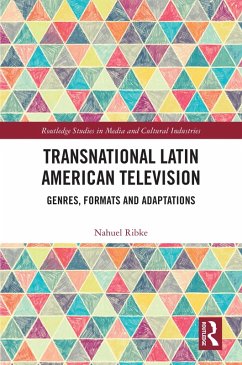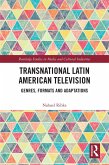Dieser Download kann aus rechtlichen Gründen nur mit Rechnungsadresse in A, B, BG, CY, CZ, D, DK, EW, E, FIN, F, GR, HR, H, IRL, I, LT, L, LR, M, NL, PL, P, R, S, SLO, SK ausgeliefert werden.
Furthermore, one of the most interesting aspects of the book is Ribke's ambition to reflect on the complex political, cultural and geographical characteristics of Latin America as a heterogeneous and diverse region."
-- Juan-Pablo Osman, Universidad del Norte, Barranquilla, Colombia
"Nahuel Ribke's book refreshes the literature on transnational media flows in Ibero- America, presenting a well-organised line of inquiry. It starts with a chapter that examines the historical evolution of television in the region over a six-decade period. In this part, Ribke identifies market size and hierarchies, intraregional political context, imagined and/or real ethnic and cultural barriers and class structures shaping national television experiences.
Based on his collection of case studies, Ribke concludes that production, circulation, and consumption of transnational television in Latin America is intense even if content flows tend to be fractured by the challenges of adaptation, and certain intra- regional protectionist biases that make national broadcasters more likely to adopt north-to-south, rather than south-to-south television flows. Such pattern of 'fragmented unity' or 'ambivalent integration' (119) is characterised by a global media market logic that is sensitive to competition from neighbours, open to imports that make business sense, while orbiting around the likes of Netflix and 'other American
national media corporations'"
-- Gabriel Moreno-Esparza, Northumbria University, UK









